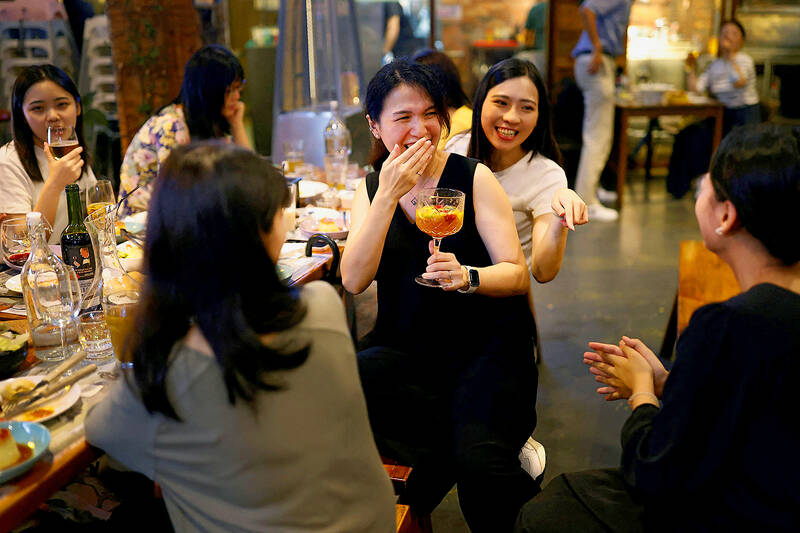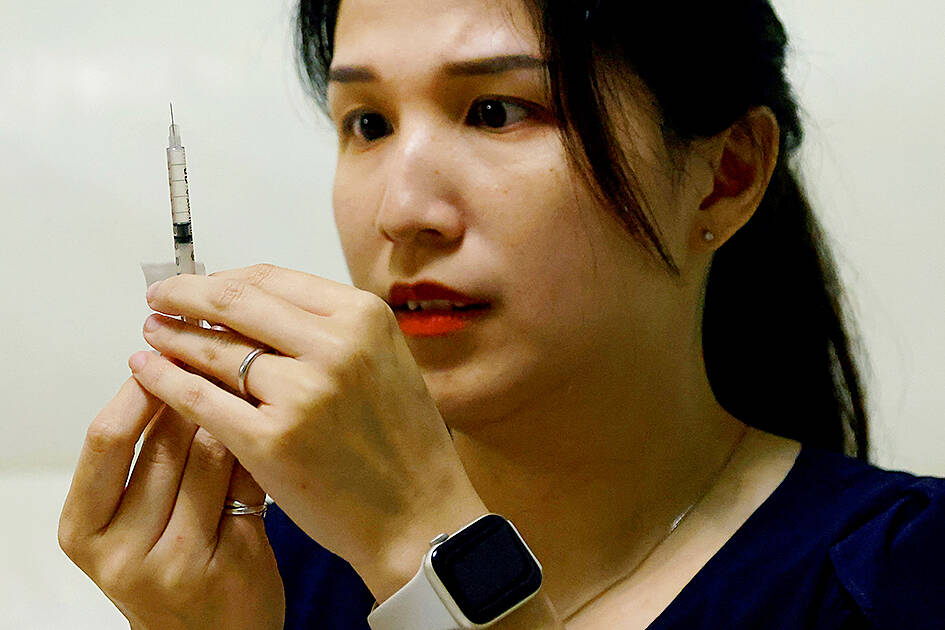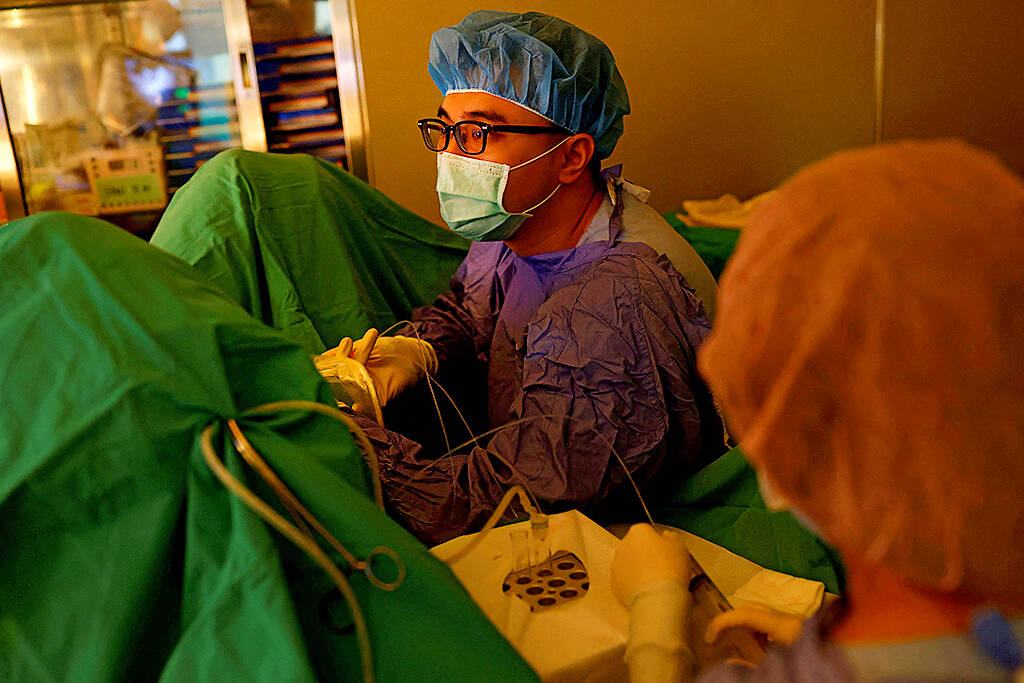Seated with her legs stretched out on her living room floor, Vivian Tung scrunched her bare stomach to find a spot where she could inject Rekovelle, a hormonal medicine used to stimulate egg production.
The 33-year-old Taiwanese brand marketing director had to inject herself daily over the two-week process it took to freeze her eggs.
Tung, who is single, is one of a rising number of women in Taiwan opting to freeze their eggs to give them the option to have a child later in life, even though under current laws they cannot use the eggs unless they marry.

Photo: Reuters
“It’s my insurance policy,” she said, explaining that many women in Taiwan are independent, career-focused and not looking to solely find a husband just to have children.
“My family is very supportive and respect my choice. When they hear that I buy insurance for myself, they also feel very good.”
Taiwan has a fertility rate of 0.89 children per woman, less than half the replacement level of 2.1 and one of the world’s lowest just behind South Korea and Hong Kong.

Photo: Reuters
Single women in Taiwan can freeze their eggs, but it is only legal to use the eggs in a heterosexual marriage, which excludes unmarried women and same-sex married couples.
Doctors in Taiwan said the restriction has contributed to only around 8 percent of women using their eggs after they have been frozen, compared with around 38 percent in the US.
LAW CHANGES

Photo: Reuters
Tung is hopeful that authorities could change regulations to allow unmarried women to have children in future.
Before her surgery, Tung had to visit the hospital every two to three days for blood tests to check her hormone levels to see how the eggs were developing, often at irregular times like 9pm due to her work schedule.
The effort was definitely worth it, she said.
“In a few years Taiwan’s laws could be liberalized due to trends or people’s rising awareness on the issue could help the government to make changes,” she said.
Taiwan became the first place in Asia to legalize same-sex marriage in 2019 and in May granted same-sex couples the right to jointly adopt a child.
But only about 4 percent of children in Taiwan are born out of wedlock, compared with about 40 percent in the US where it is more accepted.
Li Yi-Ping, chief director of the reproduction medical center at Taipei’s Shin Kong Wu Ho-Su Memorial Hospital, said there was a great chance of a policy change on egg access based on communications between the Taiwan Reproductive Association and the government, but the question was how long it would take.
“This is a very important national security issue. Now we must wait for society to form a consensus,” Li said.
Taiwan plans a comprehensive evaluation before deciding whether to expand access to artificial reproduction given it is a complex ethical, medical and legal issue involving many stakeholders, said Chen Li-Chuan, a policy specialist at the Ministry of Health and Welfare.
RISING TREND
Demand for egg freezing in Taiwan has surged, with the number of women aged between 35 and 39 opting for the technology up 86 percent over the past three years, according to a study by National Taiwan University Hospital.
More than a dozen centers offering egg freezing services opened in the last year following the pandemic, said Lai Hsing-Hua, founder of Taiwan’s first egg bank, the Stork Fertility Clinic.
Lai said new patients at Stork’s clinics in Taipei and Hsinchu have risen 50 percent year-on-year with the clinic freezing eggs for more than 800 women.
The frenzy comes as two local governments, Hsinchu and Taoyuan, this year started subsidizing egg freezing. However, only a combined 1,400 spots are available annually and an average annual salary of less than US$19,000 means egg freezing is out of reach for many women.
It costs US$2,600 to US$3,900 for the extraction, medicine and clinic visits, coupled with US$160 to US$320 in annual storage fees.
Tung paid herself, but her supportive parents drove her to the hospital on the morning of the surgery, where she pulled out her laptop in the back seat to finish some last-minute work.
Dressed in a green cotton robe and purple mesh hat to keep her hair off her face, Tung was put under general anesthesia for the 40-minute procedure and remained in the recovery room for two hours afterward.
“I’m in a lot of pain,” she said, with a blanket draped around her as she was escorted home by her parents. Once there, she appeared relaxed as she played with her dog on the living room floor.
“I really have a lot of peace of mind. If there is a chance in future and I want to have a child, at least I will have the opportunity.”

May 18 to May 24 Pastor Yang Hsu’s (楊煦) congregation was shocked upon seeing the land he chose to build his orphanage. It was surrounded by mountains on three sides, and the only way to access it was to cross a river by foot. The soil was poor due to runoff, and large rocks strewn across the plot prevented much from growing. In addition, there was no running water or electricity. But it was all Yang could afford. He and his Indigenous Atayal wife Lin Feng-ying (林鳳英) had already been caring for 24 orphans in their home, and they were in

President William Lai (賴清德) yesterday delivered an address marking the first anniversary of his presidency. In the speech, Lai affirmed Taiwan’s global role in technology, trade and security. He announced economic and national security initiatives, and emphasized democratic values and cross-party cooperation. The following is the full text of his speech: Yesterday, outside of Beida Elementary School in New Taipei City’s Sanxia District (三峽), there was a major traffic accident that, sadly, claimed several lives and resulted in multiple injuries. The Executive Yuan immediately formed a task force, and last night I personally visited the victims in hospital. Central government agencies and the

Australia’s ABC last week published a piece on the recall campaign. The article emphasized the divisions in Taiwanese society and blamed the recall for worsening them. It quotes a supporter of the Taiwan People’s Party (TPP) as saying “I’m 43 years old, born and raised here, and I’ve never seen the country this divided in my entire life.” Apparently, as an adult, she slept through the post-election violence in 2000 and 2004 by the Chinese Nationalist Party (KMT), the veiled coup threats by the military when Chen Shui-bian (陳水扁) became president, the 2006 Red Shirt protests against him ginned up by

As with most of northern Thailand’s Chinese Nationalist Party (KMT) settlements, the village of Arunothai was only given a Thai name once the Thai government began in the 1970s to assert control over the border region and initiate a decades-long process of political integration. The village’s original name, bestowed by its Yunnanese founders when they first settled the valley in the late 1960s, was a Chinese name, Dagudi (大谷地), which literally translates as “a place for threshing rice.” At that time, these village founders did not know how permanent their settlement would be. Most of Arunothai’s first generation were soldiers